Expected Outcome:
While cancer research and innovation have generated novel treatment options, cancer patients across Europe need access to more effective and patient-centred interventions which keep up with increasing demands in a complex and fragmented oncology healthcare landscape with spiralling healthcare costs.
Furthermore, the COVID-19 pandemic with its detrimental impact on cancer control has demonstrated the need for different clinical trial designs with fewer inclusion and exclusion criteria that would allow evaluation of real-world effectiveness driving better and more affordable treatment solutions that are widely accessible across EU regions, Member States and Associated Countries.
Pragmatic clinical trials focus on choosing between care options. Pragmatic trials evaluate effectiveness, the effect of treatment in routine (real-world) clinical practice. Some examples include treatment versus active surveillance in patient management, combination of treatment interventions, determination of optimal dose and dose schedule, de-escalation of treatment intervention, comparative effectiveness of different treatment interventions.
Proposals under this topic should aim for delivering results that direct, tailor towards and contribute to all of the following expected outcomes:
- Cancer patients and their caregivers will have access to optimised and affordable treatment interventions that increase their quality of life, across EU regions, Member States and Associated Countries;
- Healthcare professionals and academia will generate clinical evidence, by evaluating effectiveness in randomised or cluster-randomised academic investigator-initiated[1] pragmatic clinical trials, how to best perform and deploy evidence-based treatment interventions that improve outcomes in real life for routine healthcare, including quality of life, for cancer patients who often present with co-morbidities;
- National healthcare providers, policymakers and authorities in EU Regions, Member States and Associated Countries will have the evidence to implement optimised and affordable treatments in their healthcare systems, including in everyday medical practice.
Scope:
Proposals should address all of the following:
- Design and conduct randomised or cluster-randomised academic investigator-initiated pragmatic clinical trials to deliver effective and evidence-based treatment interventions for implementation by healthcare systems at the level of local communities, EU Regions, Member States and Associated Countries, taking into account socio-economic and biological stratification, such as biology of the disease, gender, cancer stage, and age.
- The chosen treatment intervention(s)[2] should be adapted to the particular needs of the target population and to the specificities of the provision of care at local, regional, or national level, duly reflecting the diversity across Member States and Associated Countries. Furthermore, affordability and accessibility should be taken into account.
- The successful proposals will address treatment interventions for patients with refractory cancers (cancers with a 5-year overall survival of less than 50% from time of diagnosis) at any stage of the disease, for any cancer subtype, in any age group or part of society.
- The successful proposals should clearly justify and describe the evidence supporting the chosen treatment intervention.
- The primary and secondary endpoints of the pragmatic clinical trial should target overall survival, patient-preferred clinical benefit, patient-reported outcomes and quality of life issues considered important by and for cancer patients and their caregivers. Such endpoints should be defined together with patients and their caregivers through research models that use open knowledge, (social) innovation systems and support end-user engagement (e.g. living labs).
- Implementers of pragmatic clinical trials and trial results should include physicians, academia, patients and their caregivers, patient representatives, payers, charities and foundations, research organisations, civil society, regional and national research and innovation organisations, and health authorities.
- Successful pragmatic clinical trials, including their analyses, should be completed within 5 years after the start of the project. Translational research is not within the scope of this topic.
- In all instances, sex- and gender-related issues must be taken into account. All data should be disaggregated by sex, gender, age and other relevant variables, such as by measures of socio-economic status.
This topic requires the effective contribution of social sciences and humanities (SSH) disciplines and the involvement of SSH experts, institutions as well as the inclusion of relevant SSH expertise, in order to produce meaningful and significant effects enhancing the societal impact of the related research activities.
All projects funded under this topic are strongly encouraged to participate in networking and joint activities with other ongoing projects under the mission on cancer and other cancer-relevant projects, as appropriate. These networking and joint activities could, for example, involve the participation in joint workshops, the exchange of knowledge, the development and adoption of best practices, or joint communication activities. This could also involve networking and joint activities with projects funded under other clusters and pillars of Horizon Europe, or other EU programmes, as appropriate.
The Commission may facilitate Mission-specific coordination through future actions. Therefore, proposals should include a budget for the attendance to regular joint meetings and may consider covering the costs of any other potential joint activities, without the prerequisite to detail concrete joint activities at this stage. The details of these joint activities will be defined during the grant agreement preparation phase and project duration.
In this regard, the Commission will take on the role of facilitator for networking and exchanges, including with relevant initiatives and stakeholders, if appropriate.
[1] Clinical trials in which a health technology (e.g. a medicinal product, a medical device, an in-vitro diagnostic medical device, a surgical or other medical intervention) is tested in humans, independently from commercial interest and for public health benefits.
[2] Any therapeutic intervention supported by evidence from exploratory clinical trials.





